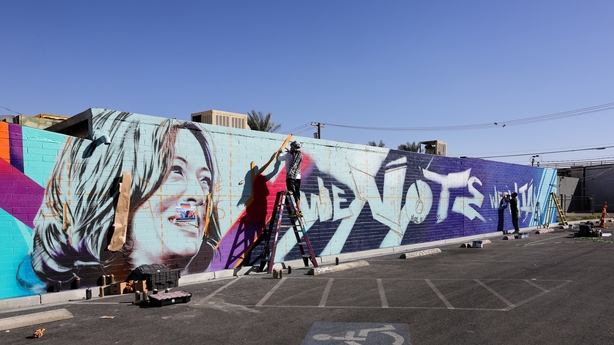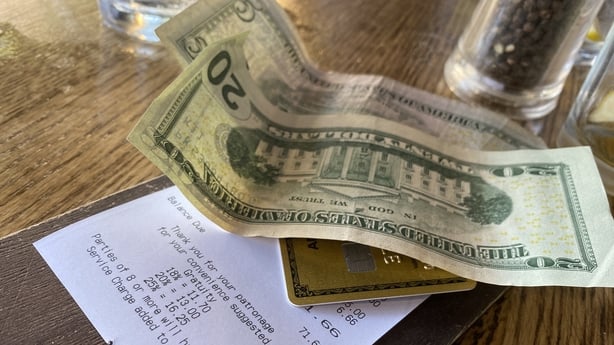Nevada is effectively a city state – and that city is Las Vegas.
Of the 3.1 million souls that live in this desert land, 2.9 million live in the Las Vegas metropolitan area.
The big industry here is hospitality, which covers food and drink, gaming, transport, and the shows for which the city is famous.
And increasingly, sport as well – a block away from where I write this, workers are building stands for the Formula One race that takes place here in late November.
One of the original big hotels on the strip has been reduced to rubble for a new stadium for the Oakland A’s baseball team, which is moving here. The NFL team, the Raiders, now play in a state-of-the-art indoor arena. And the convention centre is humongous.
The city state of Las Vegas attracted just over 36 million visitors last year to eat, drink and make merry.
All of which required service workers. And what makes that work sweet are the tips.
Nevada is also a swing state in this election, so how better to swing it over to your side (and bring with it the six electoral college votes it carries) than by making a policy pitch to the service industry workers who dominate the voter rolls here?
And that policy pitch is “no tax on tips”.
It’s a catchy phrase, and an appealing one, especially here, where it might just be the one that swings the state for Donald Trump, who came up with it over the summer.
Indeed, so successful has it been that Kamala Harris had to come out and offer her own version, a few weeks later, committing to abolish income tax on tips as well. If she hadn’t, it could have caused her real problems.
Trump is a local hotelier here in Las Vegas. A tall Trump tower with gold colored glass looms over the Strip. It all helps his credibility in this state, which Joe Biden won by just 33,000 votes last time (and where Trump increased his vote share against his 2016 performance when Hilary Clinton won here).
But is it a practical proposition to give a tax break to one form of worker and not another?
We struck out for the suburbs, and checked in on the Bagle Cafe, a mouthwatering combination of New York Deli and Mediterranean patisserie, served in US sized portions. There is a 45-minute wait time for tables on the weekends, and it works 24/7 because they bake their own bread on site.
Of course, the waitresses loved the idea of not having their tip money taxed.
Ariana told me: “I agree there should be no taxes on tips. Because half the time when you get taxed on tips, it’s a little bit more than what you expect.
“Most of my tips go to my gas, or I’ll give them to my parents so they can use it for the bills or if they need anything for groceries.”
“For me, I think it’s a very big, very big part of my pay.”
Her colleague, Karla said: “I think that’s an amazing idea. It would help out a lot to not pay so much taxes on our daily tips. We work for tips, and tips will be the biggest part of your income. I’m a server -work four days a week, and I make a living from my tips.”
As both Trump and Harris support the same idea, would it incline her to vote for one candidate over the other?
“I’m not sure, honestly, but it’s a good proposal. It doesn’t change my mind,” said Karla.

Co-owners Hugo Requelme and Pablo Lemus are not so sure about the plan – not that they don’t appreciate the life of the tip-earners, as they started out here 20 years ago as servers, living off tips, working their way up to buying out the founder.
“In theory, it sounds like a good idea: in practice, who knows how that would work, especially in a city like Las Vegas, where there’s so many restaurants everywhere,” said Hugo.
“It’s driven by tips. So, I don’t know how that would really work – getting everything to have all these people that are currently paying taxes on tips not to pay taxes on them. I don’t know how that would work for me – it’s a big hurdle.”
Do you think it would change the way you do business?, I asked.
“I don’t think it would. It would mostly benefit the servers. In our in our case, I don’t see us making any changes to any prices or making any changes to anything cost related here.”
Pablo agrees: “Like Hugo said, it’d be more benefit to the employees themselves, because there’s no benefit that we get as a business, other than incentivising the employees, in that sense, to have a higher cheque at the end of the payroll – you know, the incentive, the motivation, that’s absolutely more money in their pocket at the end of the day.”
One of the counter arguments against the whole tipping culture in the US is that there should be a higher minimum wage paid by businesses (it’s currently $7 an hour), so people would be less reliant on tips.
But in a country still trying to digest the recent inflationary spike, the business implications are clear to Pablo: “I think our business, like any others, higher pay towards the employees, it will have an effect of the business, especially with inflation and all the prices. We can’t raise the prices to a certain extent.
“I mean, there’s only so much that we can (raise prices to cover wage costs) and we don’t want to position ourselves where the customers cannot afford a meal.”
Hugo tells me that when Trump first came out with the plan a lot of customers were writing “no tax on tips” on their bills, something the Trump campaign encouraged. It was clearly a popular, if not populist proposal. The Bill-writing has tailed off since Harris agreed to the same tax break.
Over on the south side of Vegas we find ourselves in the Restaurant Lindo Michoacan, a family business with five Mexican restaurants in the Las Vegas area.
The staff here enthusiastically work for their tips, breaking into song at least six times while we were there for customers celebrating birthdays; guitars, tambourines and sombreros at the ready.
Barman Leonarda likes the idea, and its originator: “I feel like Trump should be elected, you know – he’s gonna stop the taxes from tips and all the servers and all the bar workers, because it’s not fair, because we’re walking out with half our pay cheque, and most of it goes to taxes.”

Kamala Harris had also said she’d abolish tax on tips as well, so I asked Leonardo why he wouldn’t vote for her?
“I don’t know. I feel like Trump has always been the wise guy, you know, and he’s always actually helped us.”
His colleague Maybelline on the front desk is more conflicted: “There’s like cons and pros in each of the parties. For example, Trump does like all the tax and he’s saying, like, no taxes on tips and all of that. But also, Kamala is also saying about healthcare and all of that. So, it’s a debate – it’s still going on, and it’s hard to choose which side to pick.”
Young Latino men voting Trump, a pattern that worries the Harris campaign which has seen support elsewhere drain away from the Latino community, especially the male half of it.
That may explain why the Democrats have been attacking so hard against the comedian at Trump’s Madison Square Garden rally who made off colour jokes about Puerto Ricans.
But the economics of the no tax on tips plan may not stack up. Estimates suggest it would cost hundreds of billions in revenue to implement over the next decade alone. And it would only benefit the estimated 2.5% of low paid workers who actually earn tips – leaving other low paid workers at a disadvantage.
The Harvard University Budget Lab “estimates that there were roughly 4 million workers in tipped occupations in 2023. That’s about 2.5% of all employment”.
“Perhaps surprisingly, this share does not rise substantially when just looking at low wage employment. Among workers in the bottom half of hourly wages – those earning below $25 an hour in 2023 – less than 4% were in tipped occupations. Among workers in the bottom quarter (
Both candidates have been splurging on the spending side in their campaign promises – Trump at about twice the rate of Harris, according to “The Economist” – and that in a context of the US facing a big fiscal cliff next year as the Trump era tax cuts are set to expire, setting the stage for a big congressional fight over tax dominating the political agenda next year.
And then there is the not inconsiderable matter of the US budget deficit and federal debt, which is massive.
The Tax Foundation, a think tank, has estimated “exempting tips from federal income taxes could cost $100 billion over 10 years, while the Committee for a Responsible Federal Budget (CRFB) has estimated an income and payroll tax exemption could cost $150 billion to $250 billion over 10 years. This would exacerbate the challenge of offsetting tax cut extensions and, worse, could add to an already unsustainable debt and deficit trajectory.”
Another think tank, the Bipartisan Policy Centre looked at the possible unintended consequences of not treating tips as taxable income. “For example, would workers not currently in jobs with tips be persuaded to take jobs with tips to reduce their income tax liability? (For example, a fast-food employee switches to a job as a waiter.)”
“Would workers not currently in jobs with tips (or their employers) look to add a tipping option to take advantage of “no taxes on tips?” (For example, a grocery store begins setting out a tip jar for their clerks at registers or adds a tipping option to grocery bills on a digital payment screen, and perhaps reduces hourly wages or wage increases to compensate.)”.
And then there is the Wall Street question – would the finest minds in finance not be able to figure out ways to claim they were getting a multi-million-dollar tip, not taxable bonus payments?
Back in the Lindo Michoacan Mexican restaurant, one customer celebrating his birthday (and being serenaded by the hard-working staff) took a more realistic view of the no tax on tips plan.
Richard LaVerne, a veteran himself of the hospitality industry in Las Vegas, told me: “I think it’s more of a stunt than anything else. I think the reality is, they both suggested it because they know that if she gets elected, the Republicans (in Congress) will never pass it because they don’t want to give her the victory. And vice versa, if she gets elected, the Democrats will never pass it. So, it looks good in theory, but it’s just politicians trying to buy votes, because they’ll never pass.”
It wouldn’t be the first political promise not to be carried out, but in a city built on gambling, it’s worth a punt for Trump – and a matching stake by Harris – to see if their number comes up in this swing state.
We need your consent to load this rte-player contentWe use rte-player to manage extra content that can set cookies on your device and collect data about your activity. Please review their details and accept them to load the content.Manage Preferences
